George Ward’s death by the vigilante injustice of lynching left a legacy of broken families and financial struggle. Only three generations later could great-grandson Terry Ward break the pattern, with the support of the nation’s social safety net.
But unexpected violence followed Terry Ward and invoked a reckoning of its own, almost a century later.
“I was born and raised in Terre Haute. I lived here for 18 years,” said Ward, 67, lingering in Fairbanks Park following the George Ward Historical Marker Dedication Sept. 26.
He tells his story patiently, unhurried, as he allows the listener to absorb his message. “We’ll try our best to be factual and truthful about all things,” he said.
“I was the oldest of 10 children. So, I was in school sometimes, but not all the time. Because I also worked as a young boy to help provide for the family. And that was consistent with life in the Black community. Somebody had to support the family.
“When I became old enough, about 14, they would send me away to Wisconsin to work on dairy farms.
Factory work fed a desire for something better
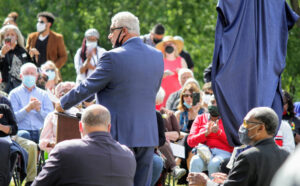
“I worked at the Terre Haute Malleable when I was 16. It was a plant where they made parts for cars. I would go to school in the morning and come in the afternoon and work in the Malleable, until got burned by one of those iron molds.
“I wasn’t educated; I wasn’t old enough to even think about doing something different.”
“And then I worked at the Terre Haute coke plant. Those jobs were minimal paid jobs, dirty sweat labor. But I wasn’t educated; I wasn’t old enough to even think about doing something different.”
Ward escaped by joining the Marine Corps. “That’s ultimately why I ended up going to the military, to try and have a better life for my family. If I died in the military, they promised us a $10,000 life insurance policy that (would allow) my mother to take care of my brothers and sisters. That was my thought process.”
Serving during the Vietnam War era, Ward said, “I had a colonel who made me his personal secretary for two years. And in that two years, I got orders three times to go to Vietnam. He rescinded my orders every time. Wasn’t meant for me to do that.
Social safety net offered opportunity
“I came back to Terre Haute after the military and with the GI Bill, I started going to Indiana State University. But the Affirmative Action program was in high swing, putting minorities in positions that only whites had (held) in years prior.
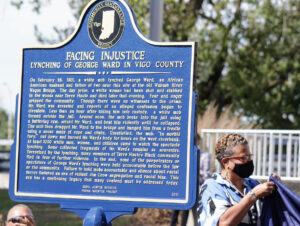
“I was one of the first black employees in the lineworking field at Public Service Indiana (now Duke Energy). And that was because I had a military background; they gave preference to military people. And that was the first time I realized the potential of making more than minimum wage in my lifetime.
“I was what they called a transmission distribution lineman. Anything and anyplace where you see power lines, I’ve done all aspects of that work. I’ve trained people, I’ve even trained the first female in the industry, in California.”
Ward retired after 42 years in the industry and today splits his time between homes in California and Indianapolis. Within that work environment, life experience drew him to the side of labor.
“It was a good career. I wish I would have gone into management” for enhanced benefits, “but I couldn’t because I was a union man and I felt like if there wasn’t somebody to fight for the rights of the union members who were coming in, in many cases the companies would have taken advantage of us.”
George Ward’s death reverberated through the generations
Labor rights and civil rights share common goals as people’s movements. Earlier, from the pulpit of nearby Allen Chapel African Methodist Episcopal Church, Ward had spoken plaintively about his people’s quest for dignity in an unyielding culture.
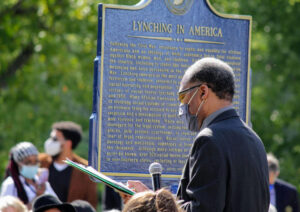
“When you have an atrocity (the lynching of George Ward in 1901 in Vigo County), it affects generation after generation after generation.
“When you have an atrocity, it affects generation after generation after generation.”
“I have to talk about economics because that is the only thing that evens the races up. Makes us supposedly equal to the society we live in. But when you have generational poverty, where do you go?
“Well, I’m thankful that God blessed me to be able to raise myself above the poverty level where the generation before me did not have the opportunity.”
Through the generations after George Ward’s death, “there was fear, there were economic discrepancies. And you have to go back to George Ward, who was only 35 years out of slavery.
“If you’re O positive and you are my friend, and you are about to die and need my blood, I would be more than willing to give you my blood. So, I don’t understand why it is that we as a people can look at somebody’s skin color and say they’re worth nothing.”
An assailant struck without warning
Racism threatens the self-esteem of oppressed individuals and breaks down cultural ties. Ward tried his best to help by mentoring at-risk youth. He acted from his self-defined definition of faith. But an unprovoked attack on April 19, 1994, left him fighting for his own life.
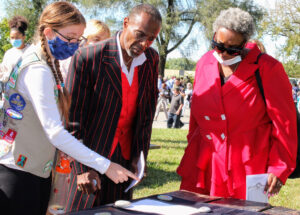
“I can’t say that I am an attender of churches, but I do believe that there is a God; there is someone greater than us, and he has all answers for mankind. I believe that.
“And the man who stood (on the stairs) two steps lower than me shot me in the head. He shot me right here,” Ward said.
“I have to say this, though. I didn’t always feel that way. In 1994, I was coming home from the supermarket in the community where I lived. I walked up to the front door of my house; I heard somebody come behind me.
“I thought it was one of my sons, because I was raising three sons there at the time. I turned around and said, ‘Gotcha!’ I remember saying that.
“And the man who stood (on the stairs) two steps lower than me shot me in the head. He shot me right here,” Ward said, pointing to a spot below his eye, and then behind his head. “First shot. Came out back here. But in the process of that, being a Marine, my next move was to try to get him.
“I tried to get him, to turn that gun on him. As I grabbed him, I was able to get his gun hand. He fired off all the rounds in the gun. But he shot me two times before I got ahold of him.
“I laid down there with him, trying to hold him, trying to do what I thought I could do to kill him. That’s what I really thought. He got away.
Vengeance is left to the Lord
“I lay there. The paramedics say I bled out. I died a medical death.”
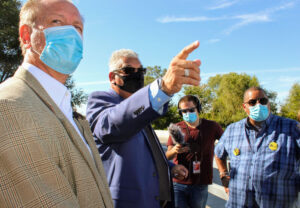
And then, Ward said, “I felt an angel of God pick me up and hold me and say to me, ‘Vengeance is mine; I shall repay; thus sayeth the Lord.'”
And then, Ward said, “I felt an angel of God pick me up and hold me and say to me, ‘Vengeance is mine; I shall repay; thus sayeth the Lord.'”
“He said it to me five times. I forgave that young man. I knew who that young man was. Because he was one of the boys that I mentored. But he was from the inner city. His philosophy about life was completely different.
“But when that angel said that to me, that’s when I really believed there was a God above. I accepted it wholeheartedly then.”
Fittingly, Ward noted, a Jewish surgeon named “Solomon” saved his life, allowing him to pursue justice with a renewed dedication.
The work for justice continues
“Since that incident I have not been able to be angry with anybody. It’s not (for) me to judge them. I believe I have a right to protect my family. But for myself, I don’t care. I just want to love. That’s what I want.

“I want to love; I want people to love one another, to appreciate one another.”
George Ward’s death and the nation’s history of racist violence should invoke horror for all Americans, he agrees.
“Yes. Not just for us! There’s also other people. That’s why I say it’s not done yet.”
The quest for understanding, acceptance and opportunity continues.
“And so today,” Terry Ward told the Allen Chapel audience, “my family and I hope that we can be seen as equal, we can be seen as part of the society that wishes to achieve as anybody else has achieved, part of the society that can become economically stable enough to take care of our families, and never go back to the time when we were considered nothing.”
